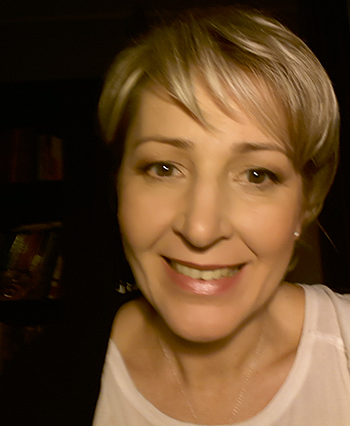
Katarzyna Łaziuk
Katarzyna Łaziuk is a graduate of USC Shoah Foundation’s Teaching with Testimony in the 21st Century professional development program and is committed to educating her students about the Holocaust – almost entirely outside her own classroom.
As an English as a Foreign Language teacher at Polska Macierz Szkolna High School in Minsk Mazowiecki near Warsaw, Łaziuk said she doesn’t usually have time to cover the Holocaust in class. But she is so passionate about the topic that she finds ways to involve students and her community in voluntary, extracurricular projects dealing with Holocaust remembrance and Jewish culture.
Her dedication stems from her own discoveries about the Holocaust that she made in 2009 when she was asked to host Israeli students at her school. To prepare, she read articles about the history of Jews in her hometown of Minsk and met with local historians. She said she was embarrassed to realize how little she knew about the rich social and cultural history of Jews and their contributions to Minsk before and after World War II.
“Once I discovered the history I felt a great responsibility to pass it to my students,” Łaziuk said.
In addition to Teaching with Testimony, Łaziuk has participated in many programs to broaden her own knowledge about the Holocaust as well as her school’s and community’s. She led her students in a project about Jewish heritage that earned the school the title “School of Dialogue” and helps organize Remembrance Days of the Holocaust in her town, which was even attended by Holocaust survivor and Minsk native Guta Tyrangiel Benezra. Benezra’s testimony is in the Visual History Archive. Laziuk is also a friend of Roman Kent, also in the Visual History Archive, and presented a 17-minute film about him at the Remembrance Days.
Testimony is an important part of all her work, Łaziuk said. Though she doesn’t have the opportunity to incorporate testimony to her English classes, she has started showing testimony clips of Benezra, Jan Karski and others to her advisory classes, which is more flexible. She and her students were very touched by Karski’s actions.
After a person watches testimony, Łaziuk said, she can’t imagine they could remain indifferent to the survivors’ stories.
“I believe learning about the past through someone’s personal experiences allows us see more,” Łaziuk said. “Numbers are important, facts as well, but testimonies let us see and understand more.”
She is currently planning a commemoration for those who were killed in Minsk during World War II which will highlight the culture, traditions and contributions of the Jewish community. Testimony will be incorporated into a guided walk throughout the city.
“There were tragic events and from my point of view it is of the most importance, but Jews should not be seen only by the prism of that history,” Łaziuk said.
Łaziuk said she identifies strongly with the idea that there is no closure when it comes to the Holocaust. The conditions that led to those tragic events are still relevant to today and must be studied and understood.
“Circumstances have been changing but what leads to atrocities seems to be still present in our contemporary world. It is hatred to the other,” Łaziuk said. “I believe that teaching the Holocaust is important as we have to remember the past and all those who suffered that much. The past is present.”